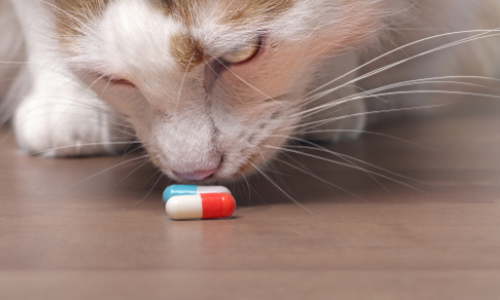
Household Items That Are Toxic to Your Pet
Curious pets explore their environments by sniffing, licking, and tasting. Unfortunately, eating or licking cleaners, pills, plants, and other items may sicken animals. These common household items can cause illness or even death if your pet ingests or inhales them.
Cleaning Products
Swallowing or licking household cleaners can cause vomiting, trouble breathing or swallowing, or tissue damage. Pets can also become sick if they lick their fur or paws after walking through or coming in contact with a wet cleaning product. The Humane Society of the United States notes that cats are more vulnerable to poisoning from cleaning products because their bodies are smaller and don't handle toxins quite as well as dogs.
Strong fumes from chemical cleaners can cause respiratory problems in pets, particularly in birds.
Protect your pet's health by:
- Following Package Instructions When Using Cleaners
- Keeping Pet Away from Cleaners Until They Dry
- Storing Products Out of the Reach of Pets or in Cabinets with Child-Proof Latches
- Rinsing Sponges, Rags, Buckets, and Mops Immediately After You Use Them
- Opening Windows Before Using Products with Strong Odors and Moving Pets to Another Area of Your Home While You Use These Items
- Throwing Away Cleaning Wipes and Paper Towels Soaked with Cleaning Products Promptly
- Closing Cleaning Product Lids and Cap Tightly
- Disposing Cleaning Products and Wipes in a Trash Can with a Secure Lid
Over-the-Counter or Prescription Medication
Medications, even over-the-counter drugs, can cause serious side effects in pets. Some drugs may even cause liver or kidney failure. Every year, the ASPCA Poison Control Center releases a list of the top10 toxins reported to its helpline. In March 2020, they reported that over-the-counter medications were the top reason for pet owner calls. Prescription medications occupied the second spot, with antidepressants, attention-deficit/hyperactivity disorder (ADHD), cardiac, and thyroid medications high on the list.
Storing all medications out of your pet's reach will reduce the risk of accidental poisoning. It's a good idea to keep your pet's medication in a safe place too. If the medication is flavored, your pet may eat too much of it and overdose.
Foods
The foods you enjoy may not necessarily be safe for your pet. Foods that might cause toxic reactions include:
- Chocolate
- Onions
- Garlic
- Chives
- Grapes
- Raisins
- Alcohol
- Nuts (Macadamia nuts can be toxic, while pistachios and almonds pose choking hazards.)
- Apple Seeds
- Coffee, Tea, and Other Caffeinated Drinks
- Doughs That Contain Yeast
- Gum, Candy, and Other Foods Sweetened with Xylitol
Skincare Products
Skincare and grooming products may also include ingredients that are toxic to animals. Keep your pet safe by storing mouthwash, lotion, petroleum jelly, bar, and liquid soap, makeup, and other items in a place that is inaccessible to your pets.
Plants
Although poinsettias are only mildly toxic to pets, contrary to popular belief, plenty of other plants can make your pet very sick. The ASPCA notes that these plants are common culprits:
- Tulips
- Daffodils
- Lily of the Valley
- Oleander
- Autumn Crocus
- Dieffenbachia
- Hyacinth
- Azalea
- Cyclamen
- Lilies
- Kalanchoe
- Sago Palm
Home Improvement Products
Spackle may not look very appealing to you, but your pet may decide it's worth a taste. In addition to triggering vomiting, the product can clump together and form a blockage in your pet's digestive tract. Any product you buy at a hardware store may contain strong chemicals and other ingredients that are hazardous to your pet's health. As with other dangerous products, it's important to keep these items on a high shelf or another secure spot.
Other Products
Your pet may also become sick after ingesting essential oils, cigarettes, nicotine, and other types of medicated patches, insecticides, and garden products.
Following safe storage and disposal recommendations can help you avoid accidental poisonings. Call our office immediately if you're concerned that your pet may have come in contact with a toxic household product.
Sources:
American Animal Hospital Association: What Are the Most Common Household Toxins for Pets?
ASPCA: Poisonous Household Products
